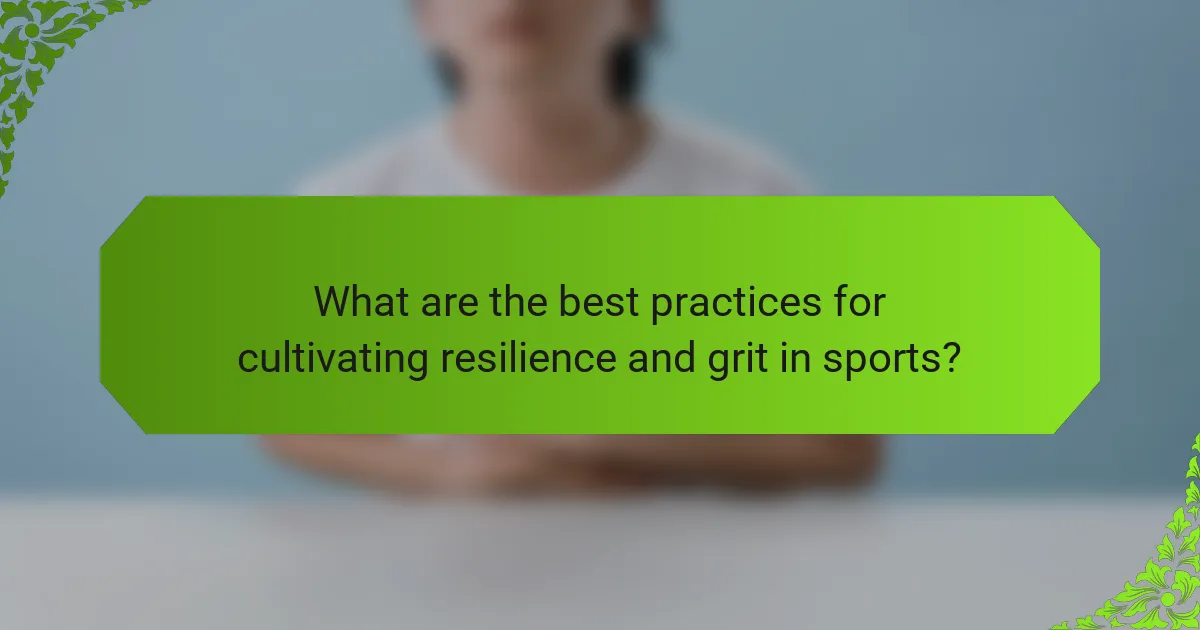Resilience and grit are crucial for amateur athletes aiming to enhance mental toughness and achieve personal growth. This article explores key principles such as adaptability, perseverance, and a growth mindset. It also highlights effective strategies like goal-setting, visualization, and mindfulness training. Finally, it discusses the importance of self-reflection and community engagement in fostering resilience.

What are the universal principles of resilience and grit for amateur athletes?
Resilience and grit are essential for amateur athletes to achieve mental toughness and growth. Key principles include adaptability, perseverance, and a growth mindset.
Adaptability allows athletes to adjust strategies in response to challenges. For example, those who embrace change are more likely to overcome setbacks. Perseverance is crucial; athletes must remain committed despite obstacles, leading to improved performance over time. A growth mindset fosters belief in the ability to develop skills through effort, which encourages continuous learning and resilience.
Moreover, setting realistic goals enhances focus and motivation, while embracing failure as a learning opportunity builds character. Collectively, these principles empower amateur athletes to cultivate mental toughness and achieve their aspirations.
How does mental toughness influence athletic performance?
Mental toughness significantly enhances athletic performance by fostering resilience and grit. Athletes with high mental toughness can maintain focus, manage stress, and recover from setbacks effectively. This psychological strength leads to improved consistency in training and competition outcomes. Studies show that mentally tough athletes often outperform their peers, particularly in high-pressure situations. By developing mental toughness, amateur athletes can unlock their potential and achieve sustained growth in their sport.
What role does perseverance play in achieving athletic goals?
Perseverance is crucial for amateur athletes to achieve their goals, as it fosters resilience and mental toughness. This quality enables athletes to overcome setbacks, remain focused on long-term objectives, and maintain consistent effort despite challenges. Studies show that athletes who exhibit high levels of perseverance often achieve greater success and personal growth. By cultivating this trait, amateur athletes can enhance their performance and develop a strong mindset essential for their journey.
What are common challenges faced by amateur athletes?
Amateur athletes commonly face challenges such as managing time, balancing commitments, and coping with pressure. These obstacles can hinder their mental toughness and growth.
Time management is crucial as athletes juggle training, work, and personal life. Many struggle to allocate sufficient hours for practice and recovery.
Balancing commitments often leads to burnout. Athletes may feel overwhelmed by competing responsibilities, affecting their performance and motivation.
Coping with pressure is another significant challenge. The desire to succeed can create anxiety, impacting focus and resilience. Developing strategies to handle these pressures is essential for growth.

What unique resilience strategies can amateur athletes adopt?
Amateur athletes can adopt unique resilience strategies such as goal-setting, visualization, and self-reflection. These methods enhance mental toughness and foster growth.
Goal-setting involves breaking down larger objectives into manageable tasks, providing clear direction and motivation. Visualization techniques help athletes mentally rehearse performances, boosting confidence and reducing anxiety. Self-reflection encourages athletes to analyze their experiences, promoting learning and adaptation.
Integrating these strategies cultivates a resilient mindset, essential for overcoming challenges in sports.
How can visualization techniques enhance mental toughness?
Visualization techniques significantly enhance mental toughness by improving focus, emotional regulation, and goal clarity. Athletes who practice visualization can mentally rehearse challenging scenarios, leading to increased confidence and resilience. This technique fosters a growth mindset, allowing athletes to view obstacles as opportunities for development. Research shows that consistent visualization can lead to improved performance metrics and a greater sense of control during competition.
What are the benefits of goal-setting in developing grit?
Goal-setting enhances grit by providing clear direction, fostering resilience, and promoting accountability. It encourages athletes to define specific, measurable objectives, which helps maintain focus during challenges. As a result, athletes develop perseverance and a growth mindset. Research indicates that goal-setting increases motivation and commitment, essential components of mental toughness. Furthermore, tracking progress reinforces a sense of achievement, driving continuous improvement. Overall, effective goal-setting cultivates a robust foundation for resilience and grit in amateur athletes.
How does community support impact resilience in sports?
Community support significantly enhances resilience in sports by providing emotional encouragement, practical assistance, and a sense of belonging. This support fosters mental toughness in amateur athletes, enabling them to overcome challenges. Studies indicate that athletes with strong community ties exhibit higher levels of grit and perseverance, which are essential for growth. As a result, the collective strength of a supportive network can lead to improved performance and overall well-being.

What rare practices can set amateur athletes apart in their resilience journey?
Amateur athletes can enhance their resilience through uncommon practices like mindfulness training, visualization techniques, and community engagement. Mindfulness fosters present-moment awareness, reducing anxiety during competitions. Visualization enhances performance by mentally rehearsing success. Community engagement builds support networks, reinforcing motivation and accountability. These rare practices cultivate mental toughness and promote growth in the resilience journey.
What unconventional training methods foster grit?
Unconventional training methods that foster grit include exposure to adversity, varied environments, and creative problem-solving exercises. These approaches challenge athletes to adapt and persevere, enhancing mental toughness. For example, training in unpredictable conditions forces athletes to remain focused and resilient. Additionally, incorporating team-based challenges promotes collaboration and accountability, reinforcing grit through shared experiences. Engaging in self-directed learning fosters independence, encouraging athletes to take ownership of their growth.
How can journaling contribute to an athlete’s mental growth?
Journaling enhances an athlete’s mental growth by fostering self-reflection and resilience. It allows athletes to process their experiences, identify strengths, and confront challenges. Regular journaling cultivates a deeper understanding of emotions, which supports mental toughness. Studies show that athletes who journal report improved focus and motivation, leading to higher performance levels. By tracking progress and setbacks, athletes develop grit, a unique attribute essential for long-term success.
What are the effects of mindfulness on resilience in sports?
Mindfulness enhances resilience in sports by promoting emotional regulation and focus. Athletes practicing mindfulness report improved stress management and increased mental clarity. Research indicates that mindfulness training can lead to a 20% increase in resilience scores among amateur athletes. This practice fosters grit, enabling athletes to persist through challenges and setbacks. Mindfulness also cultivates a positive mindset, essential for long-term growth and performance.

How can amateur athletes measure their resilience and grit?
Amateur athletes can measure their resilience and grit through self-reflection, goal-setting, and performance analysis. Self-reflection involves evaluating responses to challenges and setbacks. Goal-setting focuses on establishing specific, measurable objectives to track progress. Performance analysis includes reviewing training outcomes and competition experiences to identify areas of improvement. These methods foster mental toughness and support growth.
What metrics can be used to assess mental toughness?
To assess mental toughness in amateur athletes, several key metrics can be utilized. These metrics include self-report questionnaires, performance under pressure, emotional regulation, and consistency in training.
Self-report questionnaires evaluate athletes’ perceptions of their resilience and grit. Performance under pressure measures how well an athlete executes skills during competitive situations. Emotional regulation assesses an athlete’s ability to manage stress and maintain focus. Consistency in training reflects dedication and the ability to push through challenges.
These metrics provide a comprehensive view of an athlete’s mental toughness, crucial for growth and performance.
How can feedback from coaches enhance resilience?
Feedback from coaches significantly enhances resilience by providing tailored guidance and support. This feedback fosters a growth mindset, helping athletes view challenges as opportunities. Coaches identify strengths and areas for improvement, promoting self-awareness and adaptability. Constructive criticism encourages perseverance, reinforcing the belief that effort leads to progress. Regular feedback nurtures a supportive environment, crucial for developing mental toughness in amateur athletes.

What are the best practices for cultivating resilience and grit in sports?
To cultivate resilience and grit in sports, amateur athletes should focus on consistent practice, goal setting, and positive self-talk. Building mental toughness involves embracing challenges and learning from failures.
Developing a growth mindset is essential; it encourages athletes to view setbacks as opportunities for improvement. Incorporating mindfulness techniques can enhance focus and emotional regulation.
Regularly seeking feedback from coaches and peers fosters a supportive environment that promotes resilience. Engaging in team activities strengthens social connections, which are vital for mental fortitude.
Lastly, maintaining a balanced lifestyle, including proper nutrition and rest, supports overall well-being, enabling athletes to perform at their best.
How can athletes avoid common pitfalls in their resilience journey?
Athletes can avoid common pitfalls in their resilience journey by maintaining a growth mindset and setting realistic goals. Emphasizing self-reflection helps identify areas for improvement. Building a support network enhances motivation and accountability. Additionally, practicing stress management techniques can prevent burnout and promote mental toughness.
What expert insights can improve an athlete’s mental toughness?
To improve an athlete’s mental toughness, focus on developing resilience and grit through consistent practice and mindset shifts. Techniques such as visualization, goal-setting, and positive self-talk enhance mental fortitude. Research shows that athletes who embrace challenges and learn from setbacks demonstrate greater perseverance. Engaging in mindfulness practices can also strengthen focus and emotional regulation, essential for performance under pressure.
What actionable tips can amateur athletes implement immediately?
Amateur athletes can enhance mental toughness by adopting specific actionable tips. First, establish a clear goal that motivates consistent effort. Next, practice mindfulness to improve focus and resilience. Incorporate regular feedback sessions to evaluate progress and adjust strategies. Finally, foster a supportive community for accountability and encouragement.


